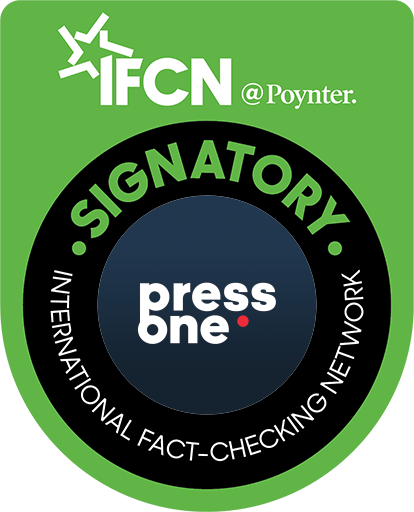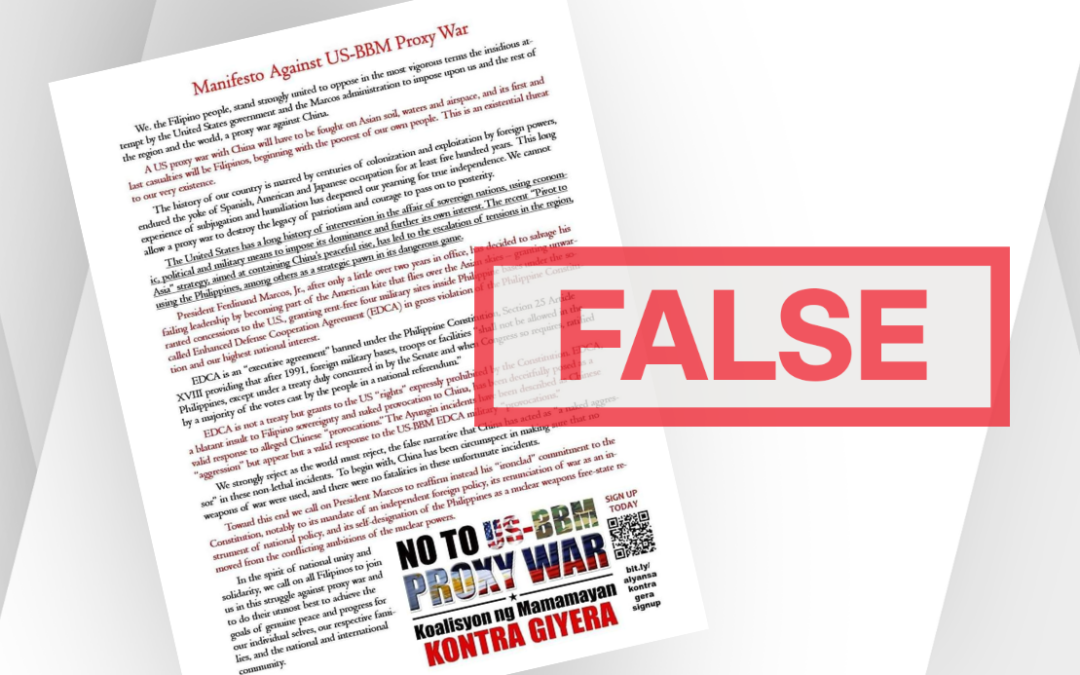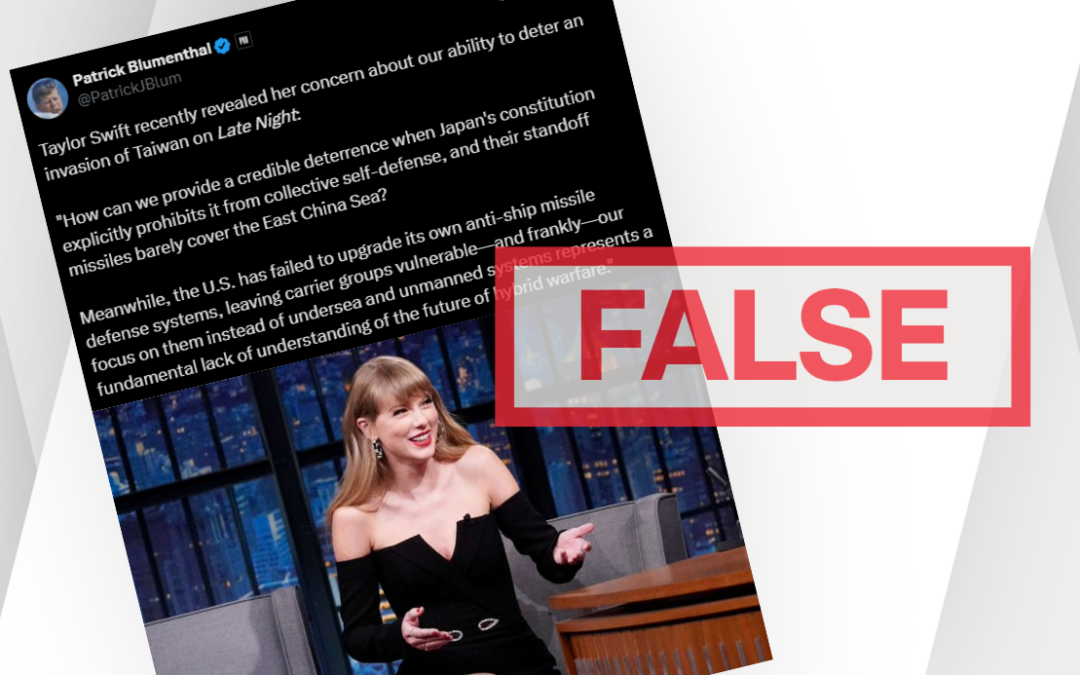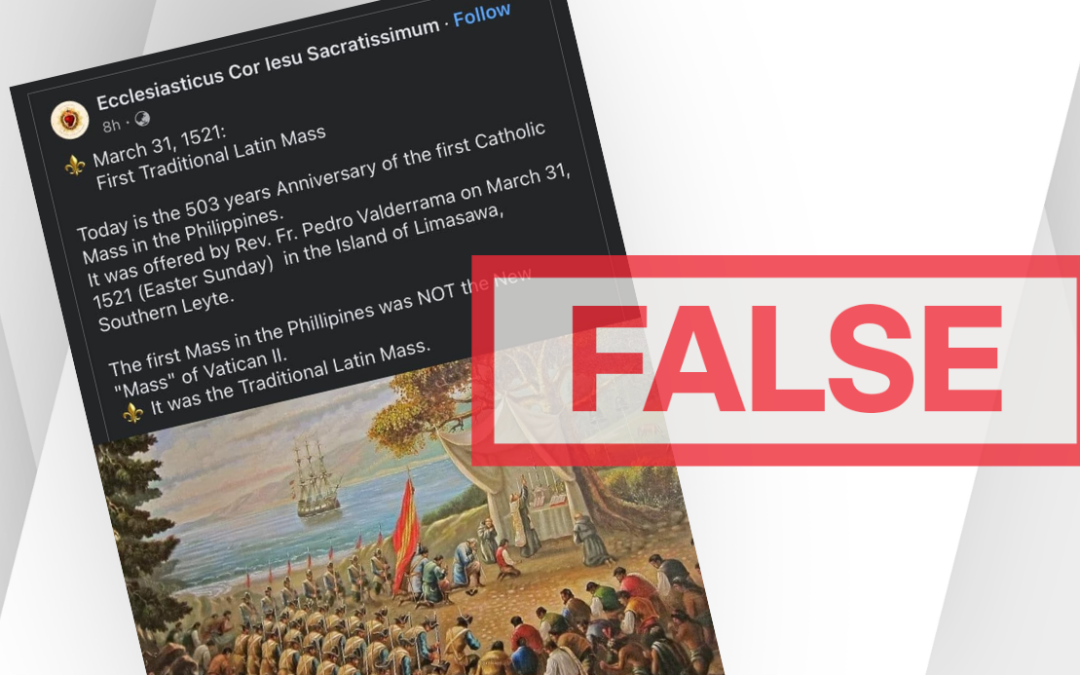Fact-checking Policy
PressOne.PH believes that fact-checking is essential to combatting misinformation and disinformation, and in informing and educating citizens and voters. PressOne.PH commits to be fair and nonpartisan in its fact-checking work. As a policy, PressOne.PH will not link back to erroneous or misleading content to avoid further harm to the public.
PressOne.PH commits to transparency in its fact-checks and endeavors to cite all its sources of information or evidence. Evidence from all relevant sides must be obtained and carefully evaluated. The sources of claims may be contacted if necessary and allowed to provide evidence to support claims within a reasonable period. The absence of a timely reply or any qualification to the original claim will not impede the publication of fact-check pieces.
Fact-checkers must disclose political, economic, or other interests of sources quoted in fact-check pieces in cases where conflicts of interest might arise, especially if these influence any conclusions made. Fact-checkers must not support politicians or political parties or engage in advocacy, especially policy advocacy, that might become the subject of fact-checking, to avoid actual or perceived biases.
How claims are selected for fact-checking
As a general rule, only verifiable claims or statements of fact (or presented as facts) are selected for fact-checking. Opinions cannot be subjected to fact-checks, but their underlying assumptions may be examined by our fact-checkers.
The selection of which claims to fact-check generally relies on objective criteria – primarily the importance or gravity of the claim, who is making the claim (a public official or business executive, for example), and how widely it has been circulated, as indicated by social media engagement. While the level of engagement on social media (likes, shares, comments) is an important criterion, content that may have the potential to reach a bigger audience or become viral may also be fact-checked.
Claims for fact-checking may be sent through our tipline on Facebook messenger or factcheck@pressone.ph, or may come from an independent scan of digital platforms by the fact-checking staff.
Methodology for fact-checks
Fact-check stories may either be pitched to or assigned by the editor, who initiates discussions and decides whether a fact-check story is feasible. These internal discussions may be done in person or online.
The writer-researcher to which the story is assigned then starts research, writes the piece, and proposes a rating. This proposed rating becomes the basis of discussion among the fact-checking staff. The editor is tasked to build consensus around a rating and makes the final decision.
All fact-checks go through the editor, who must give the go-signal to the entire story, including visual components and links, prior to uploading and posting to social media. If the editor is also the writer/researcher of the fact-check story, another staff member will be assigned to edit it.
A fact-check consists of a headline that contains the words “FACT-CHECK” to distinguish it from regular news items; the specific claim being fact-checked, the rating for the claim, and the evidence supporting the claim in the form of a narrative. This narrative or story should contain hyperlinks to sources used.
Sources must primarily be first-hand. Original sources of documents, transcripts, audio, or videos must be used. Public statements drawn from news coverage must be supported by three different journalistic accounts as proof of reliability.
Ratings are the result of discussion and consensus among members of the fact-checking staff, but are ultimately determined by the editor. In the interim, PressOne.PH is adopting the ratings options for third-party fact-checkers developed by Facebook:
- FALSE: Content that has no basis in fact. This includes:
Fake quotes
Claims that are impossible, or that could not be considered an interpretation of something that actually happened or was said
Ex: claim that a natural disaster took place, when no such event happened
Ex: claim that an individual created or patented something when they did not
Conspiracy theories that explain events as the secret work of individuals or groups, which may cite true or unverifiable information but present an implausible conclusion
Ex: claim a company is secretly engaged in drug trafficking based on an unrelated issue of charging high prices
Ex: claim without evidence that government insiders are directly responsible for a terror attack to provide a pretext for going to war
Fabricated content from websites misrepresenting themselves as real news outlets
Image, audio, or video content that is authentic but offered as proof of a separate event (i.e., false context)
Ex: authentic photo claiming to show no damage in a town after an incident, but that actually was taken before the incident
Ex: authentic video claiming to show one person confessing to a crime, but that actually is of another person
Ex: presenting an authentic but old government ordinance as if it were current, when a new ordinance contradicts the old
- ALTERED. Image, audio, or video content that has been edited or synthesized beyond adjustments for clarity or quality, in ways that could mislead people. This definition includes splicing, but not media excerpts or taking media out of context. Under our Community Standards, we also remove certain manipulated videos that are the product of artificial intelligence or machine learning, and that would likely mislead an average person to believe the subject of the video said words they did not say. This includes:
Faked, manipulated or transformed audio, video, or photos
Ex: changing the speed of a video to misleadingly alter the speech qualities of the speaker
Ex: adding an image into an authentic photo to present the appearance of something that actually never happened
Media edited to omit or reorder the words someone said to reverse the meaning of the statement
Ex: removing the word “not” from someone saying “I will not do X”
- MISSING CONTEXT. Content that may mislead without additional context. This includes:
Clips from authentic video or audio or cropping of authentic photos that lacks the full context from the original content, but that have not otherwise been edited or manipulated.
Ex: cropping a video clip of someone saying “I support that candidate if …” to include only “I support that candidate”
Media edited to omit or reorder the words someone said that changes, but that does not reverse the meaning of the statement.
Ex: editing an audio clip of someone saying “person X mishandled that disaster leading to a confused response, and that’s what killed a lot of people” to appear as if they said “person X killed a lot of people”
Hyperbole or exaggeration that is technically false but based on a real event or statement.
Ex: claiming that a government program has been “zeroed out” when its funding has been dramatically reduced but not eliminated
Content that presents a conclusion not supported by the underlying facts.
Ex: A TV host airs an interview with a source who makes a provably false assertion, and the host doesn’t affirm or question the veracity of the claim.
Claims stated as fact that are plausible but unproven.
Ex: claiming that a consumer item is safe before it has completed product safety tests
- SATIRE. Content that uses irony, exaggeration, or absurdity for criticism or awareness, particularly in the context of political, religious, or social issues, but that a reasonable user would not immediately understand to be satirical. This may be from sites not clearly labeled as or widely-known as satire, or presented without clear labeling. Content rated as Satire will include fact-checkers’ articles for more context.
- TRUE. Content that contains no inaccurate or misleading information.
The public is welcome to submit requests for fact-checks at factcheck@pressone.ph.
If you believe PressOne.PH is violating the Code of Principles of the International Fact-Checking Network (IFCN), you may submit a complaint directly to the IFCN website: https://ifcncodeofprinciples.poynter.org/complaints-policy
Fact-checking Partners

PressOne.PH is a verified signatory of the Code of Principles of the International Fact-Checking Network.


FACT-CHECK: EDCA is not unconstitutional
: A manifesto shared by a pro-China personality falsely claimed that the Enhanced Defense Cooperation Agreement between the Philippines and the United States is banned under the constitution.

FACT-CHECK: Taylor Swift did not make any comment about US ability to stop war in Taiwan
An X user made the false claim that Taylor Swift had commented about the United States’ naval capability to deter an invasion of Taiwan.

FACT-CHECK: Facebook post uses wrong painting to depict first Mass in PH
A Facebook post used the wrong painting to depict what it described as the first Mass in the Philippines.
PressOne.PH Fact-checking Team

FELIPE “IPE” F. SALVOSA II
EDITOR
Ipe is the Editor-in-Chief of PressOne.PH. He is formerly associate editor and research head of BusinessWorld, a researcher for the Financial Times Group, and managing editor of the Manila Times. He heads the Journalism Program of the University of Santo Tomas (UST) in Manila. He is a director of the Philippines Communication Society and vice president of the Journalism Studies Association of the Philippines.
–

ROMERO “ROMMEL” F. LOPEZ
WRITER / RESEARCHER
Rommel is the Associate Editor of PressOne.PH and one of the hosts of its commentary podcast, The Press Room. Prior to joining PressOne.PH, he was a freelance journalist covering the politics and religion beat, contributing to CBCP News and the CBCP Monitor since 2009. He was the managing editor of the official coverage team of the CBCP for the 2015 visit to the Philippines of Pope Francis and in 2016 for the International Eucharistic Congress in Cebu. He is a founding director of the Philippine Association for Media and Information Literacy (PAMIL) and a member of the Philippines Communication Society (PCS) and the Journalism Studies Association of the Philippines (JSAP). He teaches journalism and communication courses at the De La Salle University – Dasmariñas and the University of Nueva Caceres – Bataan.
–

NICEFORO VINCE “NIKKO” BALBEDINA III
MULTIMEDIA CONTENT PRODUCER
As Multimedia content producer, Nikko is responsible for PressOnePH’s visual and audio content as well as the site’s digital initiatives. He hosts and produces vertical-format fact-check videos available on PressOne.PH’s Tiktok and YouTube channels. Nikko is a graduate of AB Journalism from the Colegio de San Juan de Letran in Manila.
–

ANNE BEATRICE “BEA” LAGMAN
SOCIAL MEDIA MANAGER
Bea assists in making the fact-check articles available to the public through social media. She is a BA Journalism graduate of the University of Santo Tomas in Manila. She is also PressOne.PH’s editorial assistant.
–

XANDER LAUREN CIPRIANO
CONTRIBUTING RESEARCHER
Xander contributes fact-checks and covers general assignments for PressOne.PH. He is a graduating Broadcast Journalism student at De La Salle University – Dasmarinas (DLSU-D). He has been the Senior Director for Programming and Internal Affairs at 95.9 Green FM, DLSU-D’s official campus radio station. He is an alumnus of the Ayala Young Leaders Congress and interned under the Production Unit of Rappler.
–

JOHN EZEKIEL J.HIRRO
CONTRIBUTING RESEARCHER
Ezekiel covers the national government and the Inter-Agency Task Force on Emerging Infectious Diseases. He has been the Editor-in-Chief of The Varsitarian, the official publication of the University of Santo Tomas, since 2019.
Translators
RYAN CHRISTOPHER J. SOROTE is a native of Ormoc City, Leyte. He finished a degree in communication at the University of San Jose-Recoletos in 2011. In college, he reported for the oldest daily outside of Manila, The Freeman newspaper of the PhilStar Group, covering the defense, regional, and church beats. He first went on air in Cebu as a reporter for DYRC Aksyon Radyo, the flagship regional radio station of the Manila Broadcasting Company. In 2012, TV5 Network Inc. expanded its operations in the Visayas and he became one of Radyo5 Cebu’s first executive producers and later, a TV correspondent for its local newscast, AksyonBisaya. He had teaching stints at Southwestern University PHINMA’s School of Design + Communication (Cebu City) before relocating to Negros Oriental, where he teaches at the Negros Oriental State University (NORSU) Communication and Journalism Department.
–

REY SANDY “ABOY” ABAYAN is a teacher and broadcast journalist based in Eastern Samar. He is a program host for local TV and radio station DYVW with headquarters located in Borongan town, Eastern Samar. Aboy teaches Media and Information Literacy, 21st Century Literature, and Creative Writing at the Lawaan National School of Craftsmanship and Home Industries.





